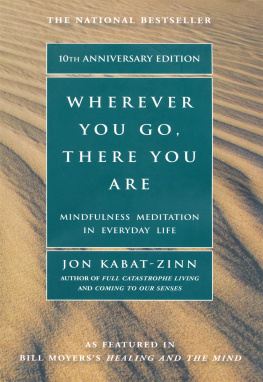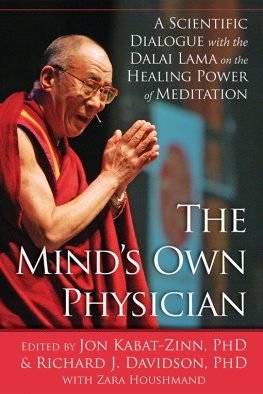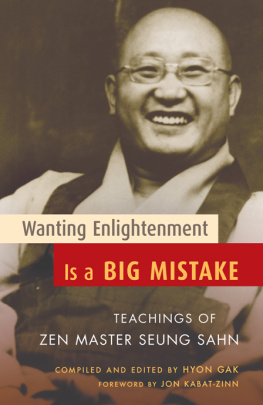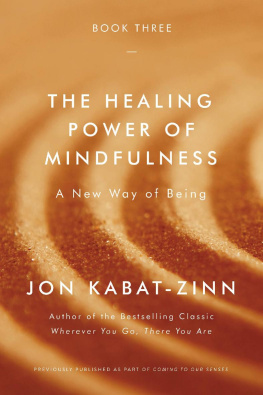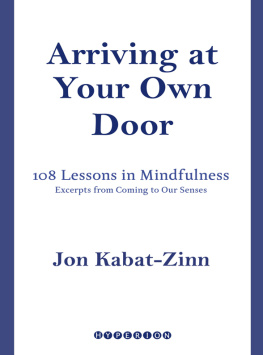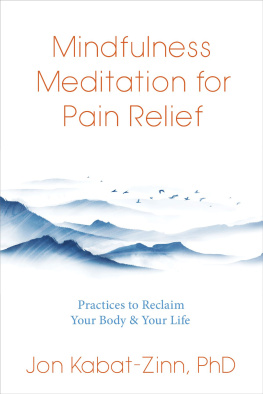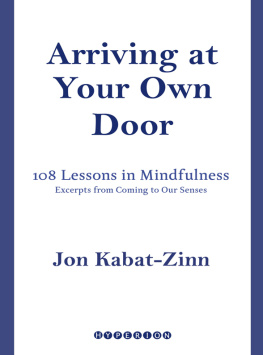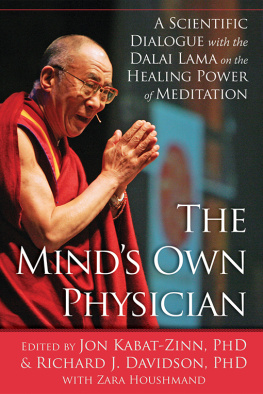10th Anniversary Edition
Wherever You Go, There You Are
Mindfulness Meditation In Everyday Life
Jon Kabat-Zinn

For Myla, Will, Naushon, and Serena,
wherever you go
Contents
The Bloom of the Present Moment
The Heart of Practice
In the Spirit of Mindfulness
Guess what? When it comes right down to it, wherever you go, there you are. Whatever you wind up doing, thats what youve wound up doing. Whatever you are thinking right now, thats whats on your mind. Whatever has happened to you, it has already happened. The important question is, how are you going to handle it? In other words, Now what?
Like it or not, this moment is all we really have to work with. Yet we all too easily conduct our lives as if forgetting momentarily that we are here , where we already are, and that we are in what we are already in. In every moment, we find ourselves at the crossroad of here and now. But when the cloud of forgetfulness over where we are now sets in, in that very moment we get lost. Now what? becomes a real problem.
By lost, I mean that we momentarily lose touch with ourselves and with the full extent of our possibilities. Instead, we fall into a robotlike way of seeing and thinking and doing. In those moments, we break contact with what is deepest in ourselves and affords us perhaps our greatest opportunities for creativity, learning, and growing. If we are not careful, those clouded moments can stretch out and become most of our lives.
To allow ourselves to be truly in touch with where we already are, no matter where that is, we have got to pause in our experience long enough to let the present moment sink in; long enough to actually feel the present moment, to see it in its fullness, to hold it in awareness and thereby come to know and understand it better. Only then can we accept the truth of this moment of our life, learn from it, and move on. Instead, it often seems as if we are preoccupied with the past, with what has already happened, or with a future that hasnt arrived yet. We look for someplace else to stand, where we hope things will be better, happier, more the way we want them to be, or the way they used to be. Most of the time we are only partially aware of this inner tension, if we are aware of it at all. What is more, we are also only partially aware at best of exactly what we are doing in and with our lives, and the effects our actions and, more subtly, our thoughts have on what we see and dont see, what we do and dont do.
For instance, we usually fall, quite unawares, into assuming that what we are thinkingthe ideas and opinions that we harbor at any given timeare the truth about what is out there in the world and in here in our minds. Most of the time, it just isnt so.
We pay a high price for this mistaken and unexamined assumption, for our almost willful ignoring of the richness of our present moments. The fallout accumulates silently, coloring our lives without our knowing it or being able to do something about it. We may never quite be where we actually are, never quite touch the fullness of our possibilities. Instead, we lock ourselves into a personal fiction that we already know who we are, that we know where we are and where we are going, that we know what is happeningall the while remaining enshrouded in thoughts, fantasies, and impulses, mostly about the past and about the future, about what we want and like, and what we fear and dont like, which spin out continuously, veiling our direction and the very ground we are standing on.
The book you have in your hands is about waking up from such dreams and from the nightmares they often turn into. Not knowing that you are even in such a dream is what the Buddhists call ignorance, or mindlessness. Being in touch with this not knowing is called mindfulness. The work of waking up from these dreams is the work of meditation, the systematic cultivation of wakefulness, of present-moment awareness. This waking up goes hand in hand with what we might call wisdom, a seeing more deeply into cause and effect and the interconnectedness of things, so that we are no longer caught in a dream-dictated reality of our own creation. To find our way, we will need to pay more attention to this moment. It is the only time that we have in which to live, grow, feel, and change. We will need to become more aware of and take precautions against the incredible pull of the Scylla and Charybdis of past and future, and the dreamworld they offer us in place of our lives.
When we speak of meditation, it is important for you to know that this is not some weird cryptic activity, as our popular culture might have it. It does not involve becoming some kind of zombie, vegetable, self-absorbed narcissist, navel gazer, space cadet, cultist, devotee, mystic, or Eastern philosopher. Meditation is simply about being yourself and knowing something about who that is. It is about coming to realize that you are on a path whether you like it or not, namely, the path that is your life. Meditation may help us see that this path we call our life has direction; that it is always unfolding, moment by moment; and that what happens now, in this moment, influences what happens next.
If what happens now does influence what happens next, then doesnt it makes sense to look around a bit from time to time so that you are more in touch with what is happening now, so that you can take your inner and outer bearings and perceive with clarity the path that you are actually on and the direction in which you are going? If you do so, maybe you will be in a better position to chart a course for yourself that is truer to your inner beinga soul path, a path with heart, your path with a capital P. If not, the sheer momentum of your unconsciousness in this moment just colors the next moment. The days, months, and years quickly go by unnoticed, unused, unappreciated.
It is all too easy to remain on something of a fog-enshrouded, slippery slope right into our graves; or, in the fog-dispelling clarity which on occasion precedes the moment of death, to wake up and realize that what we had thought all those years about how life was to be lived and what was important were at best unexamined half-truths based on fear or ignorance, only our own life-limiting ideas, and not the truth or the way our life had to be at all.
No one else can do this job of waking up for us, although our family and friends do sometimes try desperately to get through to us, to help us see more clearly or break out of our own blindnesses. But waking up is ultimately something that each one of us can only do for ourselves. When it comes down to it, wherever you go, there you are. Its your life that is unfolding.
At the end of a long life dedicated to teaching mindfulness, the Buddha, who probably had his share of followers who were hoping he might make it easier for them to find their own paths, summed it up for his disciples this way: Be a light unto yourself.
In my previous book, Full Catastrophe Living , I tried to make the path of mindfulness accessible to mainstream Americans so that it would not feel Buddhist or mystical so much as sensible. Mindfulness has to do above all with attention and awareness, which are universal human qualities. But in our society, we tend to take these capacities for granted and dont think to develop them systematically in the service of self-understanding and wisdom. Meditation is the process by which we go about deepening our attention and awareness, refining them, and putting them to greater practical use in our lives.
Next page
